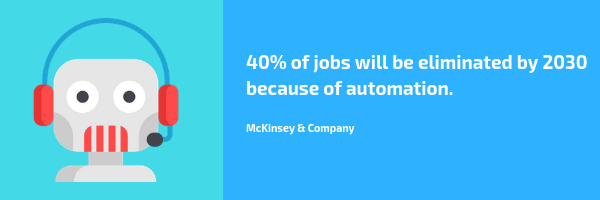Over the past decade, app development is part of a technology wave that is redefining the workplace. In particular, app development is destroying and creating jobs.
Firstly, we’ll look at how tech and app development is changing work. Then, we’ll look at technology’s impact in the fleet industry.
Technology is Not Destroying Work. It’s Changing It.

The consensus is that technology destroys jobs. After all, technology automates repetitive tasks and replaces human labour. According to a report from McKinsey & Company, 30% of tasks in 60% of jobs can be computerized. Furthermore, by 2030, 40% of jobs will be eliminated.
However, the same researchers noted that humans shouldn’t panic about automation because those 40% of people will quickly find new work. The researchers point out that jobs will be redefined or will be created from automation.
For instance, consider Amazon. At first glance, Amazon destroyed thousands of retail jobs. However, Amazon arguably created more jobs that it destroyed. Since 2007, Amazon added hundreds of thousands of workers in IT, warehousing, and customer support. Its workforce is now equivalent to a small country’s population!
Technology & App Development is Disrupting the Fleet Industry
Recent technology and app development is especially impacting the fleet industry. According to a workplace study, there is a 56% likelihood of job replacement in the transportation industry because of technological advances.
However, as previously discussed, those 56% of people shouldn’t panic. Obsolete roles will be replaced with new roles. To illustrate, we’ll discuss two examples.
Driving Jobs

Self driving vehicles are on the horizon and drivers are most affected. In fact, according to experts, traditional driving jobs will be replaced sooner rather later because several companies are already testing autonomous vehicles.
That being said, driving jobs will be converted into operating jobs. Experts mention that businesses still need to have people in vehicles for managing non-driving tasks. Hence, rather than driving, operators will be responsible for tasks such as planning routes and coordinating with other people.
Office Jobs
In addition, app development is replacing fleet office jobs. For instance, consider a fleet maintenance department. Maintenance staff are responsible for collecting vehicle reports, creating work tasks, ordering parts from vendors, and managing work.

In recent years, a disruptive technology is CMMS. CMMS automates a lot of maintenance tasks. For instance, CMMS will automatically create tasks from detected vehicle faults, order necessary parts, and remind staff to complete tasks. Yet, even with CMMS, businesses still need maintenance staff to perform work and monitor performance. The only difference is maintenance teams are spending less time on admin work.
Workplaces will Always Adapt
While it’s normal to be concerned about job automation, people can find comfort in history. Just like many times before, people found ways to create and re-invent jobs after technological disruptions. The same thing will happen for increased automation.







































